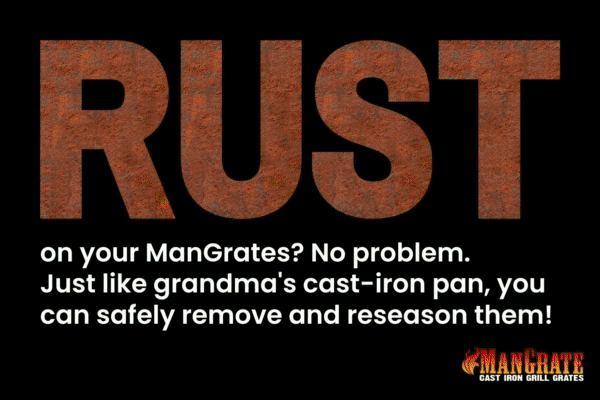Just like grandma’s cast iron pan, proper care will keep these non-stick and in good shape for a long time
Cast iron is a porous metal that has been used for cooking for many generations. There are several benefits of cooking/grilling with cast iron (more even heat retention and distribution, durability, natural non-stick surface and faster cooking times, to name a few) so it’s no wonder professional chefs and competitive grillers prefer it. Uncoated cast iron grates take a little bit of extra care, but it’s not hard to do and in the end it’s worth it.

Either horizontally (left to right) or vertically (front to back) with the flat side facing down.
Apply oil/fat to all sides of the grates, which can include: cooking spray such as PAM, a basting brush or clean rag, and a high smoke point oil
Place ManGrates, side by side, on top of your existing grilling grates
Turn grill on high, close the grill lid and let the ManGrates heat for 10-15 minutes to allow the oils to penetrate your new ManGrates; ideally the grill should reach about 500 degrees
The ManGrates are seasoned when they turn a dark brownish color (the color will become black the more you use them, and they will provide a natural non-stick surface)
Once your ManGrates heat up and are dark in color, we recommend turning your heat down to medium, as this is the ideal temperature setting while cooking with your ManGrates (trust us: they will get hot and retain the heat)
NOTE: Every time you grill, apply oil or cooking spray before cooking and again after cooking while the grates are still warm. Use a grill brush (Our ManGrate brush has extra long bristles to fully reach down) after cooking–again, before the ManGrates cool. That’s all there is to it. Fatty foods also help with seasoning and sealing the pores of the iron. Try grilling bacon!
We’ve taken two new grates and placed them to the right of well-seasoned grates. See how easy it is to season and get cooking on them!
Maintaining the grates is easy. Simply brush the grates when you’re done grilling and spray or mop on oil before closing the grill.
Check out these videos for more detailed, step-by-step instructions on seasoning ManGrates.
You can easily remove rust on the grates.
If your ManGrate seasoning has worn off or rust has developed on the grates (which can happen if moisture gets into your grill), the grates need to be properly re-seasoned. Just follow the instructions above to re-season your ManGrates or see the step-by-step process shown below. We purposely allowed ManGrates to rust so we could demonstrate how simple the re-season process really is. Nothing has been photographically enhanced. Please note that any rust dissolves and burns off during this re-seasoning process.

Season all sides of the grates.
Occasionally we hear of grates having a surface “scaling” issue, where flakes of the iron are coming off. This is a result of oxidation of the iron at high temperatures, where the top portion of the grates were seasoned, but the bottom and sides were not. The unseasoned areas of the grates deteriorate from moisture getting into the pores of the iron, resulting in irreparable damage to the grate itself. PLEASE season all sides of the grates. It is really easy to do, particularly when you use a spray oil. Over time and use, the cast iron is extremely hardy, just like cast iron skillets that have been passed on to generations of family.
Constructed with cast iron forged in Ohio. The heavy, dense composition of raw cast iron allows it to withstand high temperatures and provide excellent heat conduction and retention. No coatings that can chip, either. Just like grandma’s cast iron pan, simply oil before and after use.